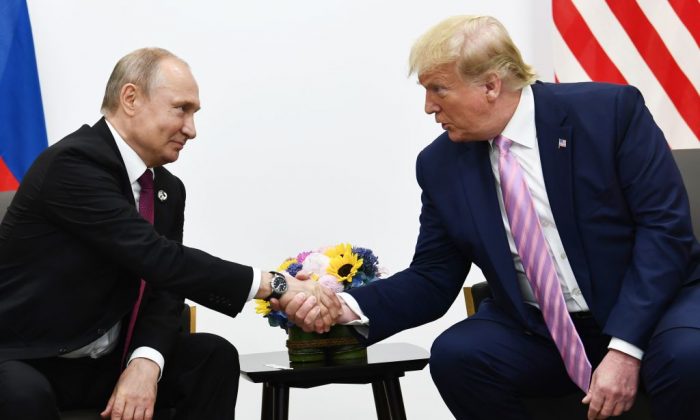Switzerland has often served as a venue for diplomatic meetings and peace talks due to its reputation for neutrality.
Switzerland and Serbia have both offered to host a potential meeting between President-elect Donald Trump and Russian President Vladimir Putin, following recent discussions about the possibility of such talks.
The Swiss Foreign Ministry said on Jan. 12 that it is willing to host talks between Trump and Putin, while Serbian President Aleksandar Vucic said on the same day that his country would be an “extremely suitable” venue for such a meeting given that both men are highly popular in the Balkan country.
Switzerland, which is not a member of NATO or the European Union, is widely recognized as a neutral country and has maintained a policy of neutrality for centuries. The country has often served as a venue for diplomatic meetings and peace talks due to its reputation for neutrality.
Serbia, which is also not a NATO member, is in the process of joining the EU, with talks at an advanced stage. The country has historically maintained close ties with Russia and has not imposed sanctions on Moscow over the Ukraine conflict.
Trump, who has vowed to broker a peace deal between Russia and Ukraine after he assumes office, announced last week that his team is working to arrange a meeting with Putin. The president-elect, who is set to be sworn into office for a second term on Jan. 20, did not provide any further details about where or when the meeting might take place or what might be on the agenda.
“That’s a war that would have never happened if I had been president, and it’s a war I’m going to try and stop as quickly as I can,” Trump said during a Jan. 9 dinner with GOP governors at Mar-a-Lago in Palm Beach, Florida. The president-elect decried the “staggering” loss of life in the Russia–Ukraine conflict, adding: “We have to get that war over with. That’s a bloody mess.”
Putin has repeatedly said Russia is ready for dialogue with the incoming Trump administration on the situation in Ukraine, and that the Kremlin is ready to make “compromises.” The Russian leader has also expressed confidence that Trump will be able to navigate the complexities of the conflict and create the conditions for a peace deal.
In a June meeting with Russian Foreign Ministry leaders, Putin outlined conditions for peace talks, including Ukrainian troop withdrawals from contested regions, Ukraine’s adoption of a neutral status, “demilitarization” of the country, and the lifting of Western sanctions.
While Trump has pledged to bring an end to the hostilities, he has offered few specifics as to how he would accomplish that. Trump has said that he would leverage his personal relationships with both Putin and Ukrainian President Volodymyr Zelenskyy to bring the two men to the table to hammer out a deal.
Zelenskyy has proposed a “victory plan” that rests on four pillars—military, political, diplomatic, and economic—and that would include permission to use Western-supplied weapons to strike deeper into Russia. Trump, who opposes allowing Kyiv to use U.S.-supplied missiles to strike inside Russian territory, appears to back a negotiated settlement that could include territory ceded by Ukraine to Russia.
Trump has appointed retired Gen. Keith Kellogg as his special envoy for Ukraine and Russia. Kellogg, co-chair of the America First Policy Institute’s Center for American Security, outlined his approach to ending the Ukraine war in an April 2024 report.
His recommendations include pursuing a formal cease-fire, delaying Ukraine’s NATO membership in exchange for a verifiable peace deal, tying U.S. military aid to Ukraine’s willingness to negotiate, offering limited sanctions relief to Russia for compliance, and establishing bilateral defense agreements to secure Ukraine’s long-term safety.
President Joe Biden has pledged to surge as much military aid to Ukraine as possible while he is still in office, saying that this would put Kyiv in the strongest possible position on the battlefield and give it the most leverage in the anticipated peace negotiations.

